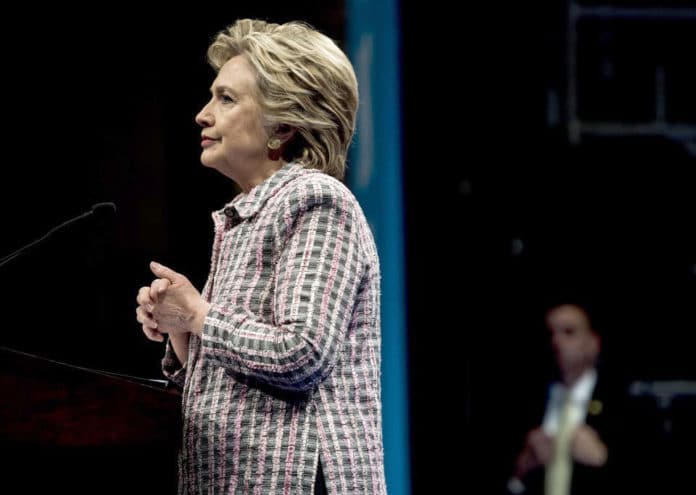CHARLOTTE, N.C. – Hillary Clinton pledged to fight for ‘end-to-end reform” of the criminal justice system as she paid a visit Sunday to a church here to commiserate with a community struggling with the fatal police shooting of a black man that sparked days of unrest.
The Democratic presidential nominee spoke for about 20 minutes at Little Rock A.M.E. Zion Church, sharing her perspective as a grandmother, she said, but acknowledging that her concerns for her grandchildren are very different from those of African-American grandmothers.
“Our entire country should take a moment to really look at what’s going on here and across America,” Clinton said. “Imagine it through our children’s eyes. It makes my heart ache when kids .. are going through this and trying to make sense of the absolutely senseless.”
Clinton delivered the last several minutes of her remarks with her arm around a 9-year-old girl she had invited to the pulpit. The girl recently addressed the Charlotte City Council about police violence and the experience of seeing African-American parents being prematurely buried.
Clinton noted that not all of the facts are known about the death of Keith Lamont Scott, 43, at the hands of police about two weeks ago. But, she said, Scott’s family and “this community is in pain. … We pray for them, and we pray for all families that have suffered similar losses.”
“Too many African-American families have been in the same tragic situation that the Scott family has found themselves,” Clinton said.
Videos released by police – one taken from an officer’s body camera and another from the dashboard camera of a police vehicle – showed Scott exiting his vehicle and falling to the ground. But they did not answer a crucial question: whether Scott was holding a gun, as police have said and his family has denied.
Clinton listed several initiatives she has pushed as a presidential candidate, including training police to “de-escalate” potentially violent situations, enacting additional gun-control measures and investing more heavily in education and job creation.
She made no mention of her Republican opponent, Donald Trump, during her remarks but decried the approach of those who say problems such as those in Charlotte can be solved “simply by more law and order” – referencing words Trump has used on the campaign trail.
That approach, Clinton said, overlooks the “systemic racism” that still exists in the country.
During the service, the Rev. Dwayne A. Walker, the church’s pastor, urged those in the congregation to vote on Nov. 8, noting that voter registration cards were located around the church.
“We’ve got a special visitor in the house,” Walker said in introducing Clinton, who remained for Walker’s sermon after she spoke.
After the church visit, Clinton planned to meet with a group of young African-American men to discuss racial, economic and social justice issues, an aide said.
Clinton had announced a trip here a week ago but postponed it after the city’s mayor raised concerns about whether it would divert law enforcement resources, which were focused on containing the unrest that followed Scott’s shooting.
The visit was Clinton’s second in a less than a week, a state with 15 electoral votes that both she and Trump have targeted. On Tuesday, she held her first post-debate rally in Raleigh, about 150 miles away.
After postponing her trip last weekend, Clinton convened a conference call with several area faith leaders to listen to their concerns about the shooting as well as broader worries about the gulf between the city’s rich and poor. She pledged support for proposals to address underlying tensions between the African-American community and the police force, according to several people on the call.
Clinton’s advisers believe that support from North Carolina’s sizable African-American population, a traditionally Democratic constituency, has helped keep the Republican-leaning state in play. Before the debate, Trump saw an uptick in polls in the Tar Heel State, but those gains were more modest than in some other battleground states, such as Iowa and Ohio, whose populations are less diverse.
Clinton’s church visit came in the wake of a report by the New York Times that Trump declared a loss of $916 million on his income tax returns for 1995 and could have used that loss to avoid paying any federal income taxes for up to 18 years. Clinton did not respond to a question on that subject shouted by a reporter as she boarded her campaign plane on Sunday morning to head to Charlotte.






